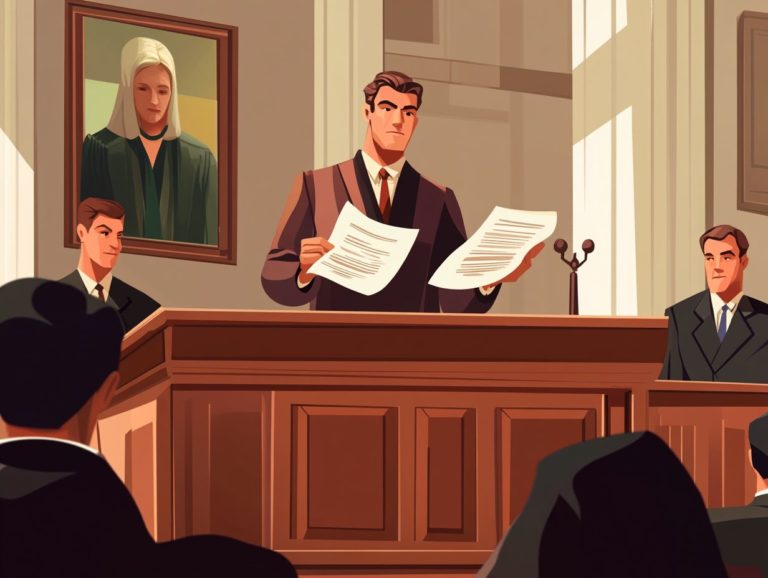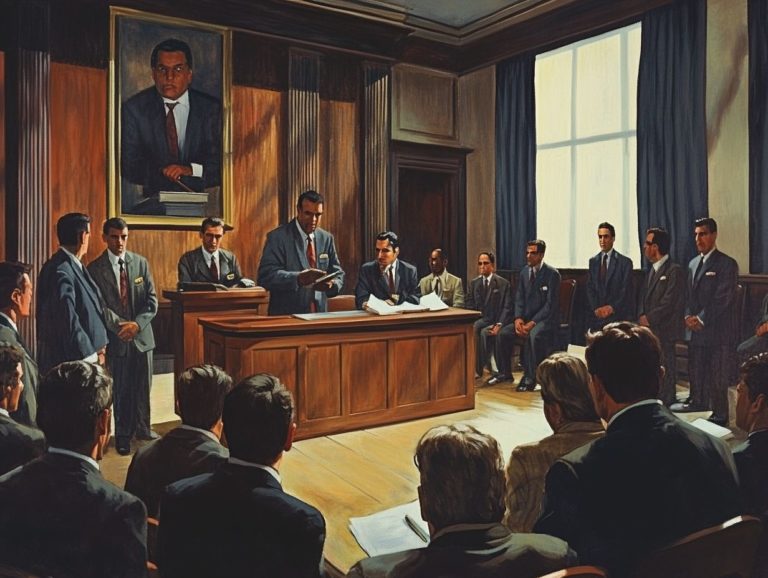The Role of Pretrial Motions in Defense
Pretrial motions are not just procedural formalities; they are essential instruments in crafting effective defense strategies in criminal cases.
This guide offers a comprehensive exploration of pretrial motions, detailing their definitions, purposes, and the various types commonly employed. You ll discover how these motions can significantly influence your case, challenge the prosecution’s evidence, and fortify your defense strategy.
It s crucial to recognize the importance of having a skilled defense attorney to expertly navigate this intricate legal landscape. Whether you re new to the realm of law or seeking a deeper understanding, this guide equips you with the knowledge to appreciate the powerful role pretrial motions play in the courtroom.
Contents
- Key Takeaways:
- The Basics of Pretrial Motions
- Types of Pretrial Motions
- How Pretrial Motions Can Help the Defense
- Challenging the Prosecution’s Case
- Preparing for Pretrial Motions
- The Importance of a Skilled Defense Attorney
- Frequently Asked Questions
- What are pretrial motions, and why do they matter?
- What types of pretrial motions can a defense attorney file?
- How are pretrial motions in defense different from motions filed during a trial?
- Can a pretrial motion in defense lead to the dismissal of charges?
- What happens if a pretrial motion in defense is denied?
- Can a defense attorney file pretrial motions in any type of criminal case?
Key Takeaways:
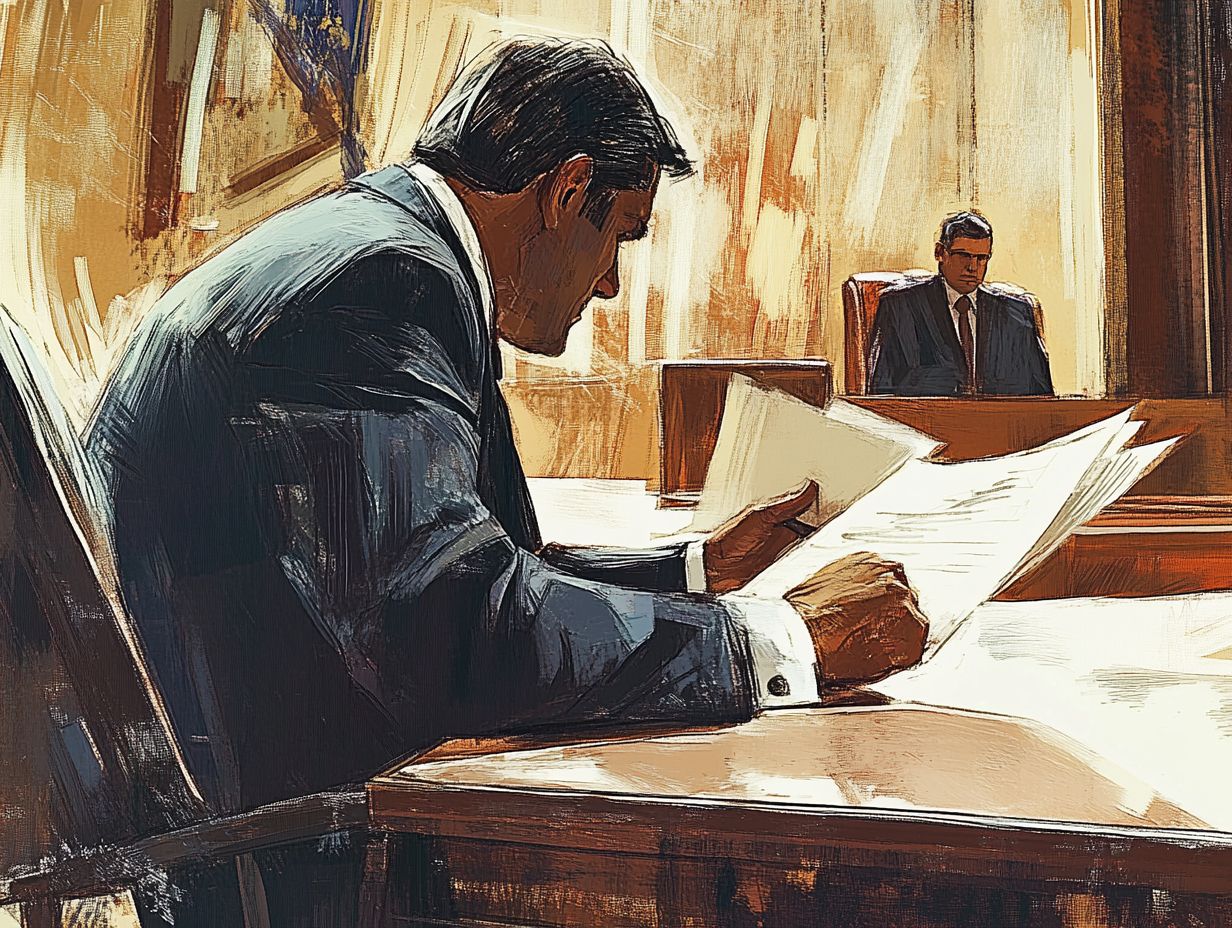
- Pretrial motions are legal requests made by the defense before a trial begins. They can help the defense by challenging the prosecution’s case and discrediting evidence.
- A skilled defense attorney can greatly impact the outcome of pretrial motions. They can gather evidence and build strong arguments to support the defense’s case.
- Pretrial motions can significantly influence the evidence presented and the overall strategy of the case. It is important for the defense to carefully prepare and utilize these motions to their advantage.
The Basics of Pretrial Motions
Pretrial motions play a vital role in the court process of criminal cases. They serve to assert your rights and challenge various elements of the prosecution’s case, so it’s important to understand what to know about pre-trial motions.
These legal tools, expertly wielded by seasoned criminal defense attorneys, encompass:
- motions to dismiss,
- motions to suppress evidence,
- requests for changes of venue.
They offer a strategic framework to shape your trial approach and ensure you receive strong legal representation in Virginia courts. Understanding pretrial motions is vital and empowering for your defense! They can greatly influence the outcome of your case by determining which evidence is admissible and how the proceedings will unfold.
Types of Pretrial Motions
Pretrial motions represent a spectrum of legal requests designed to tackle specific issues before a trial commences. Among the most prevalent are the motion to dismiss, the motion to suppress, and the motion for change of venue.
Each of these motions fulfills a distinct role in the realm of criminal defense, enabling you to challenge the legality of evidence, seek to have charges dismissed, or request a more favorable setting for your trial.
Discovery motions are crucial for securing vital information from the prosecution. They ensure you are thoroughly prepared to present your defense.
Commonly Used Motions
Among the commonly used pretrial motions, the motion to dismiss and the motion to suppress stand out as pivotal elements that can shape your defense approach. You can file a motion to dismiss when you identify legal grounds to argue that the charges should not proceed.
On the other hand, the motion to suppress aims to exclude any inadmissible evidence that may infringe on your rights, such as evidence obtained without a warrant or in violation of Miranda rights. This means keeping out evidence that was obtained in a way that violates your rights. Discovery motions serve to compel the prosecution to reveal crucial evidence, which can enhance your defense strategy.
The implications of these motions go far beyond mere procedural tactics; they critically influence your overall defense strategy and can potentially alter the trajectory of your case. If you successfully argue a motion to suppress, you can significantly weaken the prosecution’s case, forcing them to reconsider the charges or adjust their approach.
The importance of discovery motions is paramount. They provide you with access to key materials that may uncover inconsistencies in the prosecution’s arguments or open new avenues for investigation. This proactive approach ensures robust advocacy for you, safeguarding your rights and interests throughout the judicial process.
For more assistance and to navigate these complexities, consult a skilled defense attorney to strengthen your case.
How Pretrial Motions Can Help the Defense
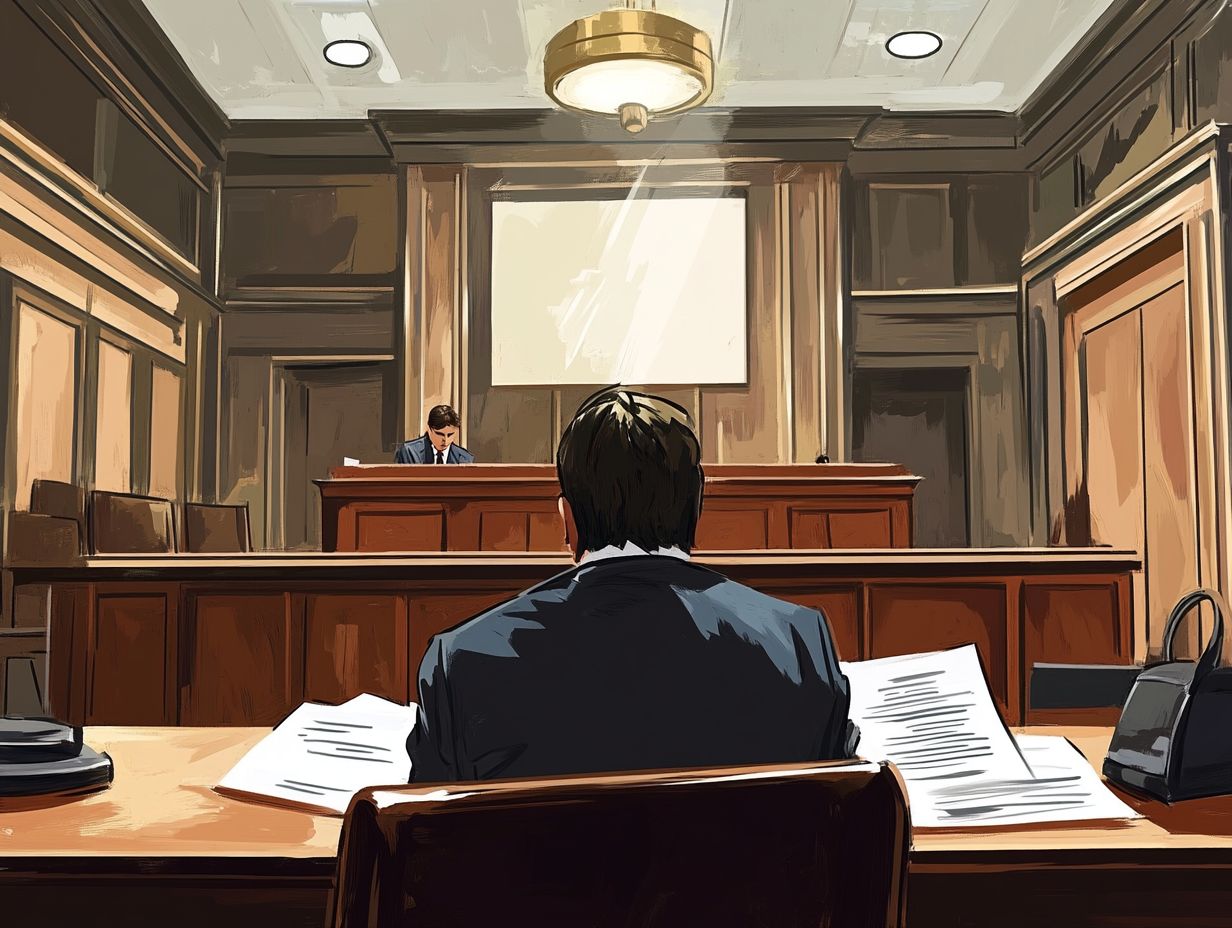
Pretrial motions are crucial in shaping your trial strategy and influencing evidence suppression. They can also pave the way for favorable plea negotiations in criminal cases.
By strategically using motions like the motion to suppress or motion to dismiss, you can strengthen your position. This often leads to reduced charges or even case dismissal.
These pretrial tools protect your rights as a defendant. They also ensure that the prosecution complies with legal standards, fostering a more equitable judicial process.
Impact on Evidence and Case Strategy
The impact of pretrial motions on evidence and case strategy is significant. These motions can determine the admissibility of crucial evidence for your defense.
When you file a motion to suppress, you can challenge the legality of evidence collected by law enforcement. This could exclude it from the trial, hindering the prosecution s case and allowing you to refine your defense strategy.
If a motion successfully excludes a key piece of physical evidence, the prosecution may find their narrative weakened. They might have to rely more on witness testimonies that could lack impact.
You may also choose to highlight your client s alibi, using this advantage to challenge the credibility of other evidence.
This shift in strategy can result in more favorable plea deals or influence juror perceptions. It shows the importance of pretrial motions in altering the trajectory of your case.
Challenging the Prosecution’s Case
Challenging the prosecution’s case is essential for effective criminal defense. This often starts with deploying pretrial motions to discredit the evidence they present.
As a defense attorney, you might use motions such as the motion to suppress and various discovery motions. These can uncover information that weakens the prosecution’s claims.
This proactive approach strengthens the rights of the defendant and enhances your position within the judicial process. It can provide vital leverage for a more advantageous outcome, whether at trial or during plea negotiations.
Strategies for Discrediting Evidence
Strategies for discrediting evidence often involve using motions to suppress. This allows you to highlight procedural violations and protect defendants’ rights.
As a skilled defense attorney, you might challenge the integrity of evidence collected by law enforcement. Raise concerns about lack of probable cause or improper search and seizure based on the Fourth Amendment, which protects against unreasonable searches.
These tactics can lead to the exclusion of critical evidence and change the trial’s direction.
Your defense strategies should also include assessing the credibility of witnesses and the reliability of forensic analysis. By examining how evidence was obtained, you can reveal inconsistencies or biases that weaken the prosecution’s case.
The effective use of suppression motions shapes proceedings, influences juror perceptions, and has profound implications for justice.
Preparing for Pretrial Motions
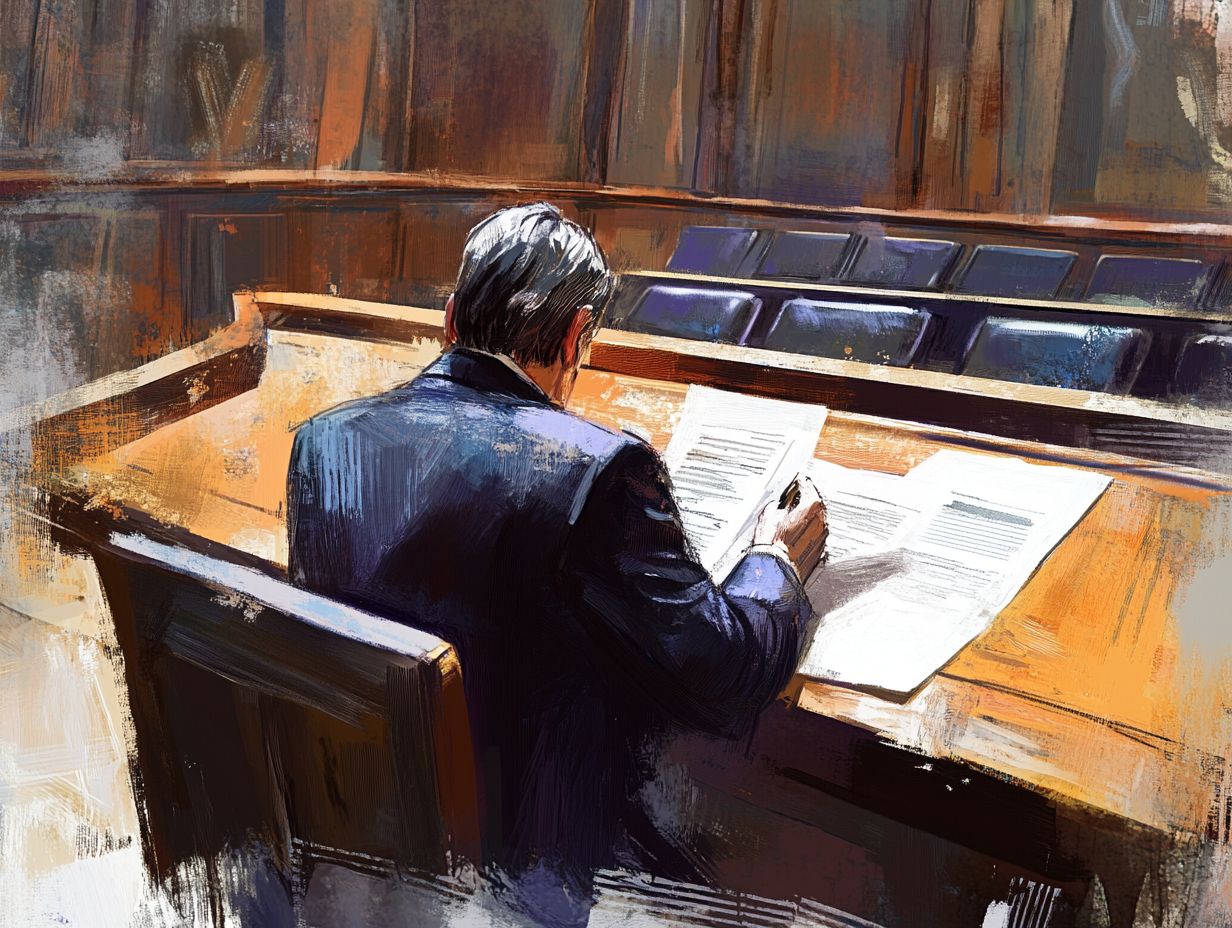
Preparing for pretrial motions is a critical step in the defense process. It requires careful gathering of evidence and crafting strong arguments.
Delve deep into the case’s details, collecting documentation, witness testimonies, and expert analyses to support motions like the motion to suppress or change of venue.
This thorough preparation increases the chances of a favorable ruling and significantly influences the case’s overall trajectory.
For more information or to discuss your case, visit our website or contact us for legal advice!
Gathering Evidence and Building Arguments
Gathering evidence and creating strong arguments for pretrial motions are essential tasks that you, as a defense attorney, undertake to secure the best possible outcomes for your clients. This process goes beyond merely collecting physical evidence and documents; it involves a thorough analysis of the legal framework surrounding the case to create compelling arguments for requests made to the court, such as the motion to suppress or discovery motions.
Ensuring that all evidence is valid and robust is crucial in supporting your defense throughout the judicial process. A comprehensive approach begins with meticulously gathering witness statements, expert testimonies, and relevant case law.
You ll need to employ strategic questioning while keeping a detailed record of your interactions. As you gather evidence, focus on identifying inconsistencies in the prosecution’s case and using these gaps to enhance your arguments.
Using technology to manage evidence improves your organization, and regularly consulting with legal colleagues can provide valuable insights from collaborative discussions.
By synthesizing this information, you can construct persuasive motions that not only challenge the prosecution’s narrative but also align with the court’s expectations for sound legal reasoning.
The Importance of a Skilled Defense Attorney
The significance of having a skilled defense attorney to navigate pretrial motions is paramount. Their expertise can profoundly influence the quality of legal representation in criminal defense cases.
An experienced attorney understands the nuances within the judicial process in Virginia, using that knowledge to file strategic motions that can suppress evidence, challenge the prosecution s arguments, and protect your rights as a defendant.
This level of legal skill not only sways the outcome of individual motions but can also impact the overall direction of your criminal case.
How an Experienced Lawyer Can Help with Pretrial Motions
An experienced lawyer can significantly elevate your defense’s position regarding pretrial motions. They navigate the intricate web of legal complexities while staunchly advocating for your rights as a defendant.
With a thorough understanding of various pretrial motions like motions to suppress and motions to dismiss these attorneys excel at formulating strong arguments that resonate with the judicial system. They are skilled negotiators, adept at maneuvering through the nuanced dynamics of criminal cases, ensuring you receive top-quality legal representation.
Their expertise often results in successful motions that can dramatically shift the trajectory of your case. For example, a carefully crafted motion to suppress evidence obtained unlawfully can lead to the exclusion of crucial evidence, undermining the prosecution s position.
A well-reasoned motion to dismiss based on insufficient evidence can result in your case being dropped altogether. These skilled attorneys actively use their negotiation skills to engage with prosecutors, potentially securing more favorable plea agreements that could reduce charges or penalties.
Ultimately, the insight and experience of these attorneys can significantly influence outcomes, guiding you through the legal landscape with a reassuring sense of security.
Frequently Asked Questions
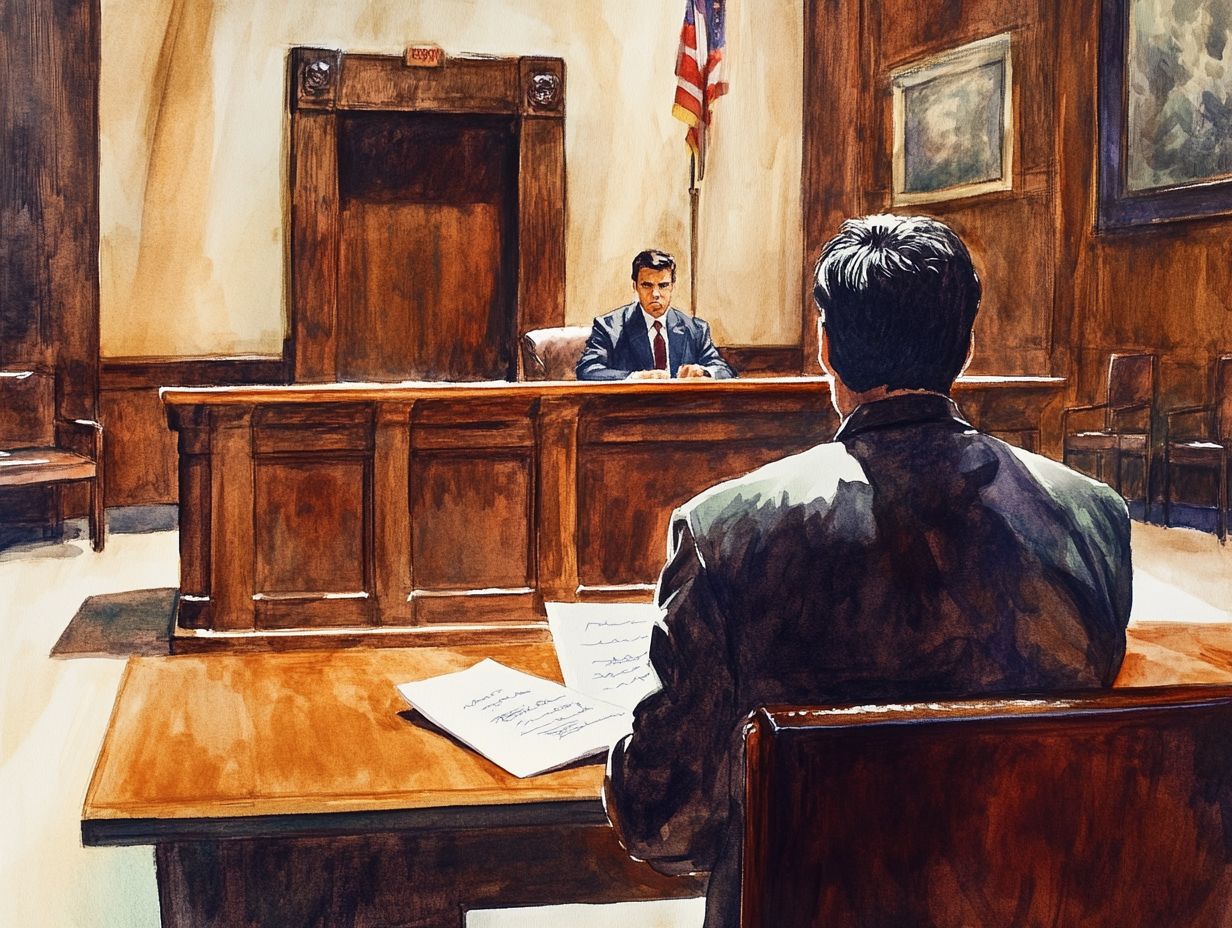
What are pretrial motions, and why do they matter?
Pretrial motions are legal requests made by a defense attorney before a criminal trial begins. They address issues such as the admissibility of evidence, the dismissal of charges, and the protection of the defendant’s rights. These motions are important because they can greatly impact the outcome of a trial and ensure a fair legal process.
What types of pretrial motions can a defense attorney file?
Several types of pretrial motions can be filed by a defense attorney, including:
- A motion to suppress evidence
- A motion for discovery
- A motion to dismiss
- A motion for a change of venue
- A motion for a continuance
Each motion serves a specific purpose and can greatly benefit the defendant’s case.
How are pretrial motions in defense different from motions filed during a trial?
Pretrial motions are submitted before the trial starts. They tackle issues that could affect the case outcome. In contrast, motions filed during a trial address issues that pop up during the proceedings, like objections to evidence. Both types help ensure a fair legal process.
Can a pretrial motion in defense lead to the dismissal of charges?
Yes, a pretrial motion can lead to charges being dropped. For instance, if a motion to suppress crucial evidence is granted, the prosecution might not have enough to proceed. Ultimately, this depends on the judge’s ruling.
What happens if a pretrial motion in defense is denied?
If a motion is denied, the issue will go to trial. The defense attorney can still argue the points to the jury. If the denied motion was about suppressing evidence, that evidence will be allowed in court.
Can a defense attorney file pretrial motions in any type of criminal case?
Yes, defense attorneys can file pretrial motions for any criminal case, whether it’s a misdemeanor or felony. These motions aim to ensure fairness in the trial process, regardless of the charges. The types of motions may differ by state or jurisdiction.





